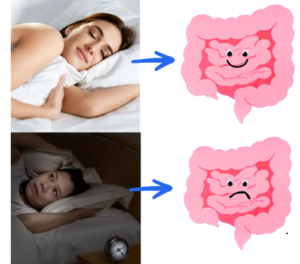Understanding the Critical Relationship Between Quality Sleep and Digestive Health
Sleep serves as more than just a period of rest; it represents a crucial process that profoundly impacts our digestion. Although the connection may not be overtly visible, the intricate relationship between sleep and digestive wellness encompasses a multitude of physiological functions that work in concert. The body’s circadian rhythm, often referred to as the internal clock, coordinates both sleep cycles and digestive processes. This alignment elucidates why individuals frequently experience hunger at similar times each day, showcasing how our bodies are expertly attuned to natural biological cycles.
Recognizing the Importance of Restful Sleep for Optimal Digestive Performance 
Sleep is essential for the body’s ability to heal, rejuvenate, and restore itself. The deeper stages of sleep are particularly critical for these restorative functions. During these profound phases, the organs, tissues, and cells that constitute the digestive system not only unwind but also engage in vital repair processes. The body prioritizes cellular repair and growth during deep sleep, especially for the renewal of cells lining the digestive tract, which endure constant wear and tear from food particles and digestive enzymes. This regeneration is vital for maintaining the integrity of the gastrointestinal lining, thereby enhancing the effectiveness of digestion.
Deep sleep also plays a critical role in strengthening the immune system, which is crucial for the digestive system, as it contains specialized immune cells activated by the beneficial bacteria inhabiting the gut. These immune cells are essential for protecting the gut and the entire digestive system against harmful microorganisms, thus ensuring a balanced microbiota within the gut environment.
Moreover, the organs of the digestive system are integral to detoxification, aiding in the removal of waste and harmful substances from the body. Deep sleep enhances this detoxification process by optimizing the functionality of the liver and kidneys, allowing these organs to operate at peak efficiency. The synergistic relationship between sleep and detoxification plays a significant role in promoting overall digestive health and wellness.
Understanding the Relationship Between Gut Motility and Sleep Patterns
A pivotal aspect of digestion involves the efficient movement of food and waste through the digestive tract, a mechanism referred to as gut motility. This process experiences significant variations during sleep. During both deep and light stages of sleep, the rate of gut motility is markedly reduced. This decrease is a necessary adaptation that allows the digestive system to conserve energy, which is then redirected towards repairing and maintaining digestive tissues. This energy conservation empowers the digestive process to operate more effectively during waking hours, optimizing both nutrient absorption and waste elimination.
The migrating motor complex is a sequence of contractions that occurs during fasting periods, including during sleep. This cycle is vital for gut motility, as it effectively clears away food particles and remnants that may linger in the digestive system. This natural cleansing mechanism of the digestive tract reduces the risk of bacterial overgrowth, fostering a healthy gut environment. Notably, the migrating motor complex is most actively engaged during the night when individuals are fasting and asleep, underscoring the essential role of sleep in preserving the health of the digestive system.
As morning approaches, gut motility gradually increases, priming the digestive system to effectively process and digest food. This surge in motility can also trigger the first bowel movement of the day, exemplifying the finely tuned relationship between sleep and gut motility. Understanding this connection is crucial for optimizing digestive health and enhancing overall well-being.
Investigating Hormonal Effects on Sleep and Digestive Function
Ghrelin, commonly known as the hunger hormone, is a key hormone that stimulates appetite. In contrast, leptin serves as a signal to the brain that the stomach is full, helping to prevent overeating. Collectively, these hormones play a vital role in appetite regulation, but their functions can be negatively impacted by insufficient sleep.
Even a single night of poor sleep can result in elevated levels of ghrelin, which can heighten appetite and frequently lead to cravings for carbohydrate-rich foods. This phenomenon is often described as feeling ‘hangry’. Compounding this issue, levels of leptin may drop after a night of inadequate sleep, disrupting the signaling that indicates fullness. This creates a challenging scenario where individuals may consume excessive amounts of food and make unhealthy dietary choices while struggling to recognize their body’s signals to stop eating. While occasional poor sleep may not lead to severe repercussions, chronic insomnia can give rise to significant digestive problems, including inflammation in the gut, liver issues, gastroesophageal reflux disease, inflammatory bowel disease, and even colorectal cancer, in addition to contributing to weight gain.
The Impact of Sleep Disruption on Digestive Wellness
Disruptions to sleep can lead to a range of digestive issues. Factors such as shift work, particularly night shifts, alongside experiences of jet lag can significantly disrupt sleep patterns and throw the body’s internal clock out of sync. Additionally, late-night eating or irregular meal timing can adversely affect the quality of sleep. The circadian rhythm that governs sleep is closely tied to natural sunlight, which is crucial for maintaining a healthy sleep-wake cycle.
Unfortunately, in our modern, technology-driven world, many individuals spend the majority of their daytime indoors, resulting in decreased exposure to natural light. This shift has led to increased exposure to blue light emitted from screens of devices like laptops, televisions, and smartphones, further disrupting the sleep cycle and sleep patterns, especially when this exposure occurs shortly before bedtime.
The cumulative effects of these factors can trigger serious digestive issues, which may include diarrhea, ulcers, inflammatory bowel disease, or disturbances in the delicate balance between beneficial and pathogenic bacteria within the gut. This imbalance can also compromise the gut lining, exacerbating challenges related to digestive health.
Enhancing Microbiome Health Through Quality Sleep Practices
The microbiome comprises trillions of microorganisms residing within the gut, primarily consisting of beneficial bacteria known as probiotics, alongside viruses, fungi, and potentially harmful bacteria. These microorganisms are essential not only for overall health but also for digestive health. They enhance immune responses and assist in digestion, facilitating the production of specific vitamins, enzymes, hormones, and amino acids. Recent studies have illustrated a significant connection between the microbiome and sleep, indicating that disrupted sleep or chronic insomnia can negatively impact the balance of these microbes, ultimately affecting digestive health and overall well-being.
Delving into the Complex Interplay Between Microbiome Health and Sleep Quality
The relationship between sleep and microbiome health is intricate and multifaceted. Insufficient sleep can adversely affect microbiome balance, while an imbalanced microbiome can also detrimentally influence sleep quality. To grasp this complex interaction, one study found a correlation between a higher abundance of certain bacterial types in the gut and quicker sleep onset, as well as fewer awakenings throughout the night. Although this article cannot cover all the findings, the critical takeaway is that cultivating a diverse and abundant population of beneficial bacteria within the gut is vital for achieving optimal sleep, effective digestion, and maintaining overall health.
Analyzing the Interrelationship Between Stress, Sleep, and Digestive Well-being
A frequent outcome of stress and anxiety is disrupted sleep. Conversely, these mental health challenges can also negatively affect the physical health and functionality of the digestive system. Such disruptions can lead to altered gut motility and contribute to conditions like indigestion, ulcers, and irritable bowel syndrome. A crucial factor in this dynamic is the influence of the so-called stress hormone, cortisol.
Investigating How Cortisol Affects Digestive Processes
When cortisol levels rise, the body’s response is to enter a fight-or-flight state. This physiological reaction results in blood flow being redirected to vital areas such as the heart, brain, lungs, and muscles while diverting it away from the digestive system. This response prepares the individual to either confront danger or escape, a reaction that was crucial for survival in ancient times.
In contemporary society, however, stressors often pose less immediate threats, such as financial worries, workplace pressures, or inadequate sleep. While short-term redirection of blood flow may be beneficial in acute situations, chronic stress can adversely affect the digestive system, particularly regarding gut motility. This can result in symptoms like constipation, diarrhea, indigestion, gas, and bloating. Therefore, implementing effective stress management strategies is essential for supporting both gut health and achieving restorative sleep.
Securing sufficient sleep is essential for maintaining a healthy digestive system, as the connection between sleep and digestion is fundamentally intertwined. Prioritizing effective sleep hygiene practices is crucial for achieving restorative sleep. This encompasses reducing exposure to blue light from electronic devices, adhering to a consistent sleep schedule, creating a cool, dark sleeping environment, avoiding food intake within two hours before bedtime, and ensuring exposure to natural light during the day, especially in the morning.
References
Understanding Digestive Health and Circadian Rhythms
Exploring Sleep Dysfunction and Digestive Conditions
Examining the Link Between the Gut Microbiome and Sleep
Investigating Stress and Its Effects on the Digestive System
The Article: How Sleep Affects Your Digestive System appeared first on https://janestevensnutrition.com
The Article: Sleep’s Impact on Your Digestive System Explained appeared first on https://janestevens.net
The Article Sleep’s Impact on Digestive Health Explained Was Found On https://limitsofstrategy.com





Comments are closed